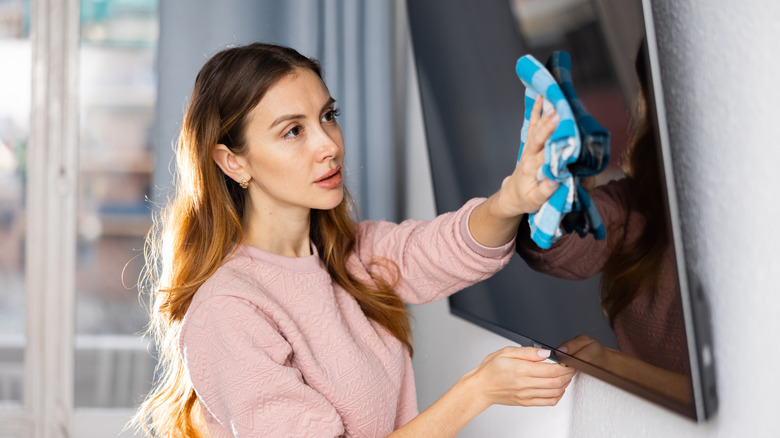If You Use Glass Cleaner On Your TV Screen, Here's What Will Happen
When enjoying your favorite shows, there's nothing more important than having a good view. It's essential to make sure your television screen is as clean as possible so you can watch hours of entertainment the way it was meant to be seen. But imagine sitting down in your living room to watch a series you've been looking forward to, only to have your viewing experience ruined from a cleaning solution that you thought was going to clear up and improve the picture. As it turns out, using window cleaning products you'd normally use on household windows and mirrors is one of the key mistakes to avoid while cleaning your TV, as it will cause streaking, dulling, and damage that will severely impact the visibility of what's on the screen.
Television screens are treated with a special anti-glare finish that prevents sunshine and other harsh lights from reflecting on the screen and obstructing your view, making the image on the TV more crisp and clear. Lots of glass cleaners that are available to buy include chemicals like alcohol and ammonia that weaken the covering and strip it away, leaving a blotchy, streaky, and hard-to-watch image. While some mild, chemical-free window cleaners may be safe to use on certain screens, you should always check directions and warnings on even the "ammonia-free" versions to ensure they won't be a hazard.
Avoid damage to the TV screen by using a mild DIY cleaner
The integrity of a television screen isn't the same as a window or mirror, as some are especially thin and easy to damage, whether from chemical cleaning ingredients, excessive moisture, scratchy cleaning materials, or even too much pressure as you wipe them down. Because of this, screens require a different type of routine to properly get the job done. The TV should be cleaned with delicate products that do not include harsh solvents or abrasive ingredients. In fact, you can easily clean your TV screen with items you already own, namely some distilled water and a microfiber cloth. Distilled water will prevent any unsightly deposits from being left behind on the screen while being effective enough to lift minor blemishes. To keep the task as easy as possible, it may be helpful to establish a schedule for cleaning your TV screens around the house.
If the screen is currently in good shape, cleaning should be easy. Dust the TV lightly with a microfiber cloth regularly to keep dust and smudges to a minimum. Wipe across in a linear side-to-side direction rather than rubbing in circular movements. If there happens to be an area of the surface that holds on to dirt or fingerprints, a small amount of distilled water can be applied to the cloth and dabbed onto the TV screen. You could also use a TV cleaning product, but these typically consist mostly of water anyways. Remember to never put a liquid directly onto the screen. If water must be used, apply the liquid to a cloth before wiping down the surface, using only a small amount to prevent moisture from getting behind the screen and damaging the electronics.

